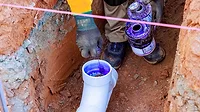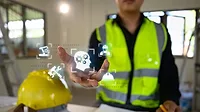From the Editor | Kristen Bayles
From leak to lesson: Why transparency and trust matter just as much as the tools in the plumbing and mechanical trades

Image courtesy of Nikola Stojadinovic / E+ / Getty Images
About a year ago, I left for a weekend trip and returned to a flooded apartment. Something had gone horribly wrong with the garbage disposal while we were away, and water was spouting out from it every minute or so. Stack that “every minute or so” throughout three days, and you get the unfortunate feeling of wet carpet when you step back into the real world after a weekend of fun!
As luck would have it, it was a Sunday when we returned, so we only had the emergency maintenance man to help us try to figure out what to do in the meantime. It was completely uninhabitable, so he recommended that we leave for the night, make some calls in the morning and just try not to stress too much until then.
We called the office for our building a few minutes after they opened – can’t seem too desperate! – to fill them in on the situation. They were apologetic, told us that they would keep in touch about when we could return home and let us know what had happened.
Four days passed without a word from the office. One day, we even called them twenty times, and none of our calls were answered. Fed up with the lack of communication, we finally went back to the apartment that evening to find the pipe under the sink replaced and our carpets nearing the level of dryness that we could step on it without cringing at the feeling.
In the grand scheme of things, we were quite lucky: the only damage was to the carpet and an old laptop that I hadn’t used since my college days, plus some unimportant items that had been hastily left on the ground in the rush to leave. The real damage was in our trust in the apartment complex.
We were left in the dark about what had happened, how we could have prevented it and when we could return to our home. I don’t blame the garbage disposal, the company that produces it or the person that installed it. It doesn’t matter how advanced or well-designed a system is, it’s only as effective as the team supporting it — and how well that team communicates with the people who rely on it.
In those four days of radio silence, we weren’t just inconvenienced, we felt forgotten. We weren’t sure if someone was working on it, if it had been resolved or if it might happen again. That uncertainty became the true damage. The plumbing was fixable; the lack of communication left a lasting impression.
Professionals in the plumbing and mechanical trades hold more responsibility than they often get credit for. Not just for the safety and function of buildings, but for the peace of mind of those who live and work in them. With every installation, service call or system check, you’re doing so much more than just managing a system; you’re managing expectations, mitigating risk and reinforcing trust.
That trust is built in many ways:
- Proactive communication; not just solving problems, but letting occupants and building managers know what’s being done, when and why.
- Embracing connected technologies like remote leak detection, smart water shutoffs and cloud-based building monitoring systems that can alert both technicians and tenants in real time.
- Being accountable and transparent — owning the work, documenting it well and leaving no room for confusion.
This isn’t just good customer service, it’s critical infrastructure management. In a world where aging buildings and growing complexity strain resources, clear, timely communication is just as important as physical repairs.
Every successful system relies on more than the tools and materials; the people who design, install, monitor and maintain it are just as important. The best pros have a commitment to transparency and reliability.
This experience reinforced something I’ve come to believe ever since I saw the trade professionals in my family interacting with customers when I was a child: systems alone aren’t enough. A leak sensor can be cutting-edge, but if no one responds to the alert — or worse, if the occupant isn’t told what’s happening — then it’s a missed opportunity. Every successful system relies on more than the tools and materials; the people who design, install, monitor and maintain it are just as important. The best pros have a commitment to transparency and reliability.
You can install the most sophisticated system on the market, but if it’s not backed by a clear maintenance plan and open communication with the people who use it, then it’s falling short of its potential.
Every valve turned and sensor installed is part of something bigger: it’s a promise that someone’s home, school, hospital or business will function as it should. But, that promise is only as strong as the follow-through and the follow-up.
My time in this industry has taught me a lot of things, but none more important than this: most plumbing and mechanical professionals take immense pride in their work. Whether you’re ensuring clean drinking water in a school, maintaining steam systems in hospitals or helping a family recover after a flood, you are the backbone of every community.
So, if you’re the person who sends the update before the question gets asked, who checks the sensors and makes the call before the damage gets worse or who explains the why behind the work, you’re not just doing your job – you’re helping someone feel safe and informed in their own space.
That matters. That’s the kind of trust that builds lifelong relationships with customers.
In this industry, trust is built not just on performance. It’s built on communication, care and human connection. In moments like mine, that can make all the difference.
I didn’t expect a plumbing emergency to remind me how much trust is at the heart of this industry, but I’m glad that it did. So, thank you to those who show up early and take the time to explain what’s happening behind the wall or under the floor.
You don’t just fix problems, you prevent panic. You restore peace of mind. That’s something no leak sensor can do on its own.
Looking for a reprint of this article?
From high-res PDFs to custom plaques, order your copy today!







